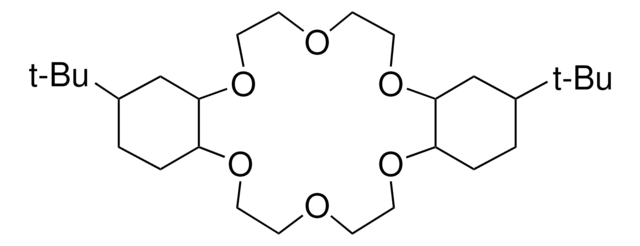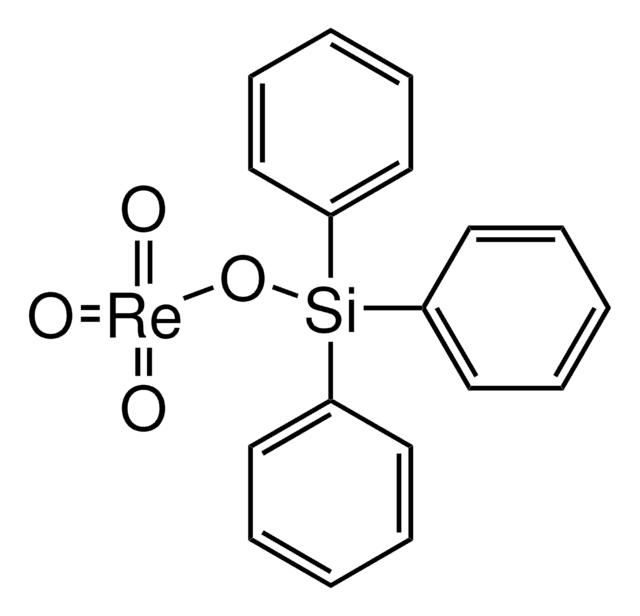412910
Methyltrioxorhenium(VII)
Re 71.0-76.0 %
Synonym(s):
MTO, Methylrhenium(VII) trioxide
Sign Into View Organizational & Contract Pricing
All Photos(2)
About This Item
Linear Formula:
CH3ReO3
CAS Number:
Molecular Weight:
249.24
Beilstein:
3927932
MDL number:
UNSPSC Code:
12161600
PubChem Substance ID:
NACRES:
NA.22
Recommended Products
form
solid
Quality Level
composition
Re, 71.0-76.0%
reaction suitability
core: rhenium
reagent type: catalyst
mp
111 °C (lit.)
SMILES string
C[Re](=O)(=O)=O
InChI
1S/CH3.3O.Re/h1H3;;;;
InChI key
PQTLALPZRPFYIT-UHFFFAOYSA-N
Looking for similar products? Visit Product Comparison Guide
Application
Potent catalytic oxidant for converting alkenes to epoxides in a variety of solvents and 2-methylnaphthalene to 2-methyl-1,4-naphthoquinone (Vitamin K3).
Catalytic oxidant used with urea hydrogen peroxide in an efficient conversion of imines to nitrones.
An effective antioxidant under various conditions.
Catalytic oxidant used with urea hydrogen peroxide in an efficient conversion of imines to nitrones.
An effective antioxidant under various conditions.
Storage Class Code
11 - Combustible Solids
WGK
WGK 3
Flash Point(F)
Not applicable
Flash Point(C)
Not applicable
Personal Protective Equipment
dust mask type N95 (US), Eyeshields, Gloves
Choose from one of the most recent versions:
Already Own This Product?
Find documentation for the products that you have recently purchased in the Document Library.
Customers Also Viewed
Steven W Baldwin et al.
Organic letters, 6(10), 1653-1656 (2004-05-07)
Cycloaddition reactions between a new homochiral imidazolone-derived nitrone afford cycloadducts in high yield and with high stereoselectivity. Subsequent cycloadduct elaboration affords the gamma-lactones of gamma-hydroxy-alpha-amino acids as well as the optically pure amino acids themselves.
Bee Hong Soon et al.
Frontiers in physiology, 8, 231-231 (2017-05-10)
The role of mitochondria in tumorigenesis has regained much attention as it could dysregulate cellular energetics, oxidative stress and apoptosis. However, the role of mitochondria in different grade gliomasis still unknown. This study aimed to identify mitochondrial DNA (mtDNA) sequence
Veronika Huntosova et al.
Molecules (Basel, Switzerland), 26(2) (2021-01-23)
Detection of tissue and cell oxygenation is of high importance in fundamental biological and in many medical applications, particularly for monitoring dysfunction in the early stages of cancer. Measurements of the luminescence lifetimes of molecular probes offer a very promising
Inorganic Chemistry, 32, 4517-4517 (1993)
Shaunak Sen et al.
ACS synthetic biology, 6(8), 1461-1470 (2017-04-25)
Biomolecular temperature sensors can be used for efficient control of large-volume bioreactors, for spatiotemporal imaging and control of gene expression, and to engineer robustness to temperature in biomolecular circuit design. Although RNA-based sensors, called "thermometers", have been investigated in both
Our team of scientists has experience in all areas of research including Life Science, Material Science, Chemical Synthesis, Chromatography, Analytical and many others.
Contact Technical Service















